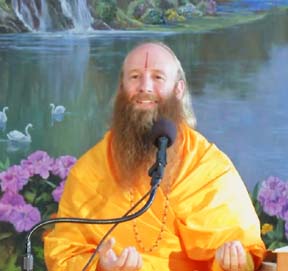
We all want to know the answers to questions such as, “Who is God?” and “Why am I here?” the purpose of life and so on. In order to receive reasonable explanations, we have to find an authoritative and dependable source of knowledge. To think that we can get the answers to the questions merely based on our intellects is naïve, since these subjects are beyond our intellect, and hence on our own, we can only speculate. Thankfully, God makes this knowledge available to us.
Why would He not? He has produced this world for the singular purpose of giving us the chance to attain Him, so why would He not use His power to make the required knowledge available as well? Just like there is milk produced in the bosom of the mother even before the baby is born, similarly, before human population begins on earth, God produces the knowledge in the form of the Ved (which includes the Upanishads). That way, we are not left to wander aimlessly, but rather, we can acquire correct spiritual knowledge from the Ved, and proceed on the genuine path of God realization.
How is Ved produced on earth?
Ved is not a book which is written by someone, or a collection of speculations by different scholars. Ved is said to be both ‘paurusheya’ and ‘apaurusheya’. ‘Paurusheya’ means produced by God. ‘Apaurusheya’ means not made by anyone, not even God. You see, like God, souls, and maya, Ved is also eternal. It is Divine knowledge which resides eternally within God. In fact, Ved is considered to be God Himself ([vedo narayanah sakshat [Bhagwatam]). Since souls are eternal, and have eternally been under the bondage of maya, they have eternally been in need of knowledge to guide them. Thus, the knowledge must also be eternal. And it is contained in the Ved. Since Ved is eternal, it means that it was never made by anyone; including God (thus it is ‘apaurusheya’).
However, Ved disappears within God during pralaya (dissolution), so it must be manifested by Him and made available again in the world during srishti (creation). Since God manifests Ved in the world, Ved is also called ‘paurusheya’, which means produced by God. But it is not composed by God, it is manifested by Him in the exact same way it existed before pralaya, in the previous srishti (for this reason it is also called ‘vinirgat’).
The sounds of Vedic Mantras
One might wonder whether the words or sounds of the Vedic mantras are eternal. Actually, there are 4 levels of ‘vani’ or vocalization: para vani, pashyanti vani, madhyama vani, and vaikhari vani. Each one is progressively less subtle. The sounds of the Ved reside within God in the most subtle form during pralay (para vani). Then they are transmitted by God to Brahma through pashyanti vani and madhyama vani.
Pashyanti and madhyama vani cannot be heard by the ears – they are perceived directly by the mind, or can even be received on a more subtle level. Then Brahma transmits the Ved to the first rishis of the earth planet through pashyanti and madhyama vani. After which, those rishis produce it in vaikhari vani, which can be heard by the ears.
Vaikhari vani is also of two types: upanshu (whispered in the ear) and ucchayi (spoken out loud). For many generations, Ved is taught only orally, because the rishis in their Divine minds have the capacity to retain the entire 100,000 mantras of the Ved after only hearing it once (this is also why Ved is known as ‘Shruti’).
Later, for the benefit of ordinary souls, the Vedic mantras are recorded in written form, which is available in part today. In the next article, we will learn more about the Ved and how they can be utilized to fulfill the goal of human life.
Disciple of Jagadguru Shree Kripaluji Maharaj
Swami Nikhilanand Ji is a Canadian born Hindu spiritual leader based in Austin, Texas. He is a sanyasi disciple and pracharak of Jagadguru Shree Kripaluji Maharaj.
Attracted to the teachings of Hinduism from a young age, Swamiji eventually let his deep spiritual longing lead him to India, where he was most fortunate to come under the guidance of Shree Kripaluji Maharaj. Thereafter, living in the ashrams of JKP, he extensively studied Hindi, the philosophy of the prime Sanskrit scriptures (Vedas, Darshan Shastras, Gita, Bhagwatam), and practiced meditation in the tradition of raganuga bhakti.
In 2003, he was given sanyas. Now, with the blessings of his Guruji, he offers satsang programs throughout America, engaging audiences with his clear explanations of Hindu philosophy coupled with inspired chanting of Sanskrit mantras and shlokas and charming nam sankirtan. His informative and compelling speeches provide practical insight into how to adopt the teachings of Sanatan Dharm into our daily lives, and inspire us to awaken our inner spiritual potential.
To stay in touch with Swami Nikhilanand Ji, like his Facebook page at https://www.facebook.com/SwamiNikhilanand or follow him on twitter at https://twitter.com/Swami_Nikhil.
Swami Nikhilanand






